#and is not necessarily a useful concept depending on the type of analysis you're doing
Note
Can you define what a word is rly quick thanks <3
(I'm only trolling you a little bit, I do wanna hear what you have to say tho)
no <3
#literally i don't have an answer#i think it's very contextual to the language variety at hand#and is not necessarily a useful concept depending on the type of analysis you're doing#like! what i'm currently writing up focuses on a root + its immediate affixes#is that construction a word? is a root alone a word if it's obligatorily marked in practice?#much to consider
63 notes
·
View notes
Text
Daenerys Targaryen: The Romantic Hero
In which I dissect more thoughts on ASOIAF brought on by House of the Dragon and my reread of Fire & Blood, and in which I make the argument that, despite the flaws of HotD as a show and F&B as a novel, its pure existence backs up this main idea:
Daenerys Targaryen is not and will never be a villain. She's a goddamn romantic hero with a bittersweet--not tragic--ending. In the books. If we ever get the books.
Jon and Tyrion are also Romantic heroes, by the way.
Okay, sure, that's not exactly a new take. But what exactly do these terms mean?
Literary Tropes and Archetypes
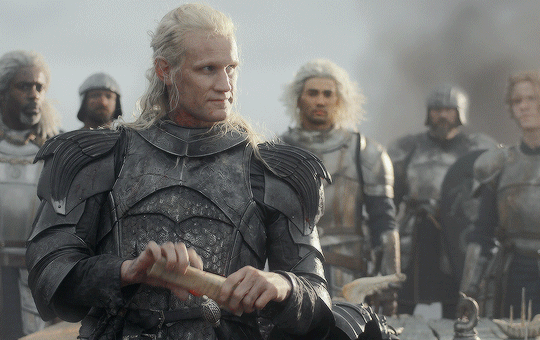
Obviously, when you're talking about something as subjective as literature (subjective in the sense that we all bring our outside baggage, experiences, and assumptions to our reading experience), you're going to get some variation on what terms mean. That's even without considering inherent linguistic shifts.
However, there are general consensuses of what these terms mean. I'm going off the general consensus.
So going forward, before I delve into analysis, let's look at the terms and how they are generally understood, and indeed understood in this meta.
Nihilism and cynicism: Nihilism at its philosophical core is not necessarily hopeless (positive nihilism does exist). However, the colloquial use of "nihilism" does mean hopeless and bleak, and even positive nihilism asserts that nothing exists with meaning, not even concepts like free will. What I'm working off here is the colloquial association of nihilism with grimdark cynicism. That's technically reductive for nihilism, so I'm going to use cynicism more for grimdark pessimism, but nihilism for the literal "nothing matters."
Tragedy: I wrote a long elaboration of what tragedy consists of for RWBY here. The basics apply to this meta, as well. Tragedy is usually not equivalent to nihilism, nor is it pessimistic. There are a million different variations, but the point is to stimulate grief and satisfaction (catharsis) in the audience.
Tragic Hero: Again, this differs depending on the type of tragedy you're writing. I'll just quote what I said in the RWBY piece:
Tragic heroes are great people. They are more than just their worst traits, and yet in the end we, the audience who have access to their complex legacy in ways most characters don’t, are left with the grief that comes with things ending in a sad way when they could have ended so triumphantly.
In ASOIAF, I've argued before that Arianne and f!Aegon are classic tragic heroes, as is Stannis Baratheon.
Villain: An antagonistic character who, despite how sympathetic they may be, is always destined for destruction and for whom we don't see much other option. We're meant to root against them, unlike tragic heroes, in which we're meant to be torn at worst and rooting for in other sense.
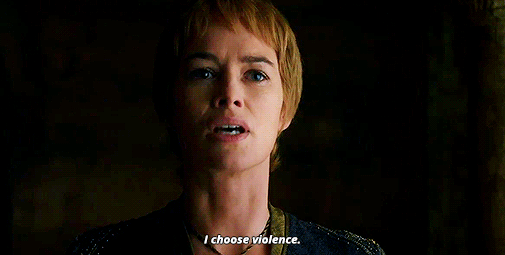
The perfect example here is Cersei Lannister. We care about Cersei, we can see why she became the way she is, but there's no hope for her. A tragic hero can admittedly become a villain (see: RWBY's Ironwood), but their crossing the line completely depends on framing.
Antagonist: A character who opposes the goal of a protagonist. They may be villains, but they are also fairly likely not to be, especially in a morally gray world like ASOIAF. The role is easily slipped in and out of.
Romantic Hero: A Romantic hero is a societal outcast who... yeah I'm just gonna quote Northrop Frye, a literary critic:
[The Romantic Hero is] placed outside the structure of civilization and therefore represents the force of physical nature, amoral or ruthless, yet with a sense of power, and often leadership, that society has impoverished itself by rejecting.
This is very clearly Jon, Dany, and Tyrion, far more so than the other three obvious protagonists (Sansa, Arya, and Bran). A bastard, an exile, a dwarf. All three are leaders with moral different than the society's they're raised in and society is poorer for it. Jon is the most Ned Stark-like of his siblings, but has been rejected. Dany is anti-slavery. Tyrion is practical and actually good at ruling unlike pretty much everyone else in King's Landing.
Of course, their rejection has all three heading for straight amoralism by the end of ADWD. Jon's already taken an infant from his mother, and the baby's probably going to die as a result. Plus, he is not gonna come back from the dead caring about duty anymore. Dany's embracing "fire and blood." Tyrion's full-on plotting savage revenge. When Dany lands on Westeros in The Winds of Winter, she's going to be a literal force of nature (fire).
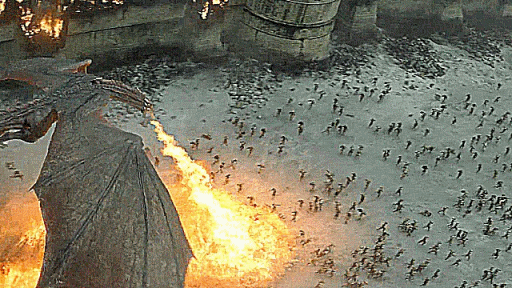
Romanticism: Romantic doesn't mean romance as in kiss kiss fall in love. I mean, it often does involve that, but when I say romanticism I'm referring to the literary movement. Romanticism focuses on the internal even more so than the external, on the individual development of a character. It focuses on free will, on beauty, which in some ways does indeed make it opposite to nihilism at its most technical. It suggests there is meaning to be found in our experiences and in the world beyond us, too.
A Song of Ice and Fire is a Romantic work. That's not debatable. Why? Well, George RR Martin has said it. Twice. At least.
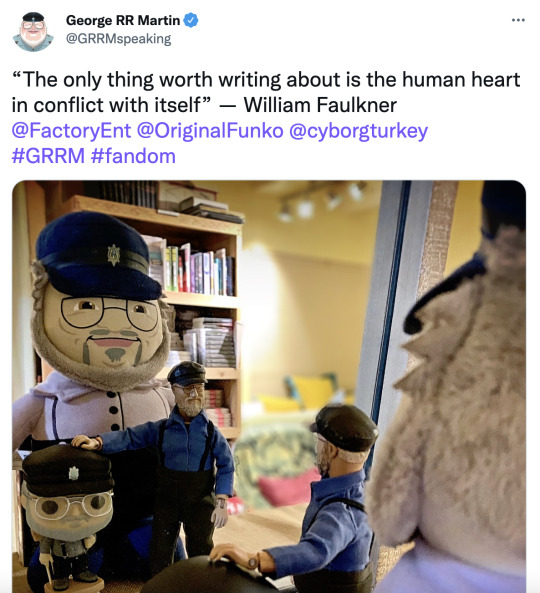
The human heart against itself is Romanticism at its core.
Also, Martin himself has insisted he is not a nihilist:
My worldview is anything but nihilistic. I was always intensely Romantic, even when I was too young to understand what that meant. But Romanticism has its dark side, as any Romantic soon discovers… which is where the melancholy comes in, I suppose.
I mean, that's explicit. There you go. Thanks George. Fight yourself and finish the books, I beg of you. The events in his story matter, therefore.
Deconstruction: This gets tricky because general consensus does actually differ more so than the other terms (besides maybe nihilism). It's literally defined as:
a philosophical or critical method which asserts that meanings, metaphysical constructs, and hierarchical oppositions (as between key terms in a philosophical or literary work) are always rendered unstable by their dependence on ultimately arbitrary signifiers
Deconstruction can mean the complete and utter decimation of a literary trope to show why what's good is bad and what's bad is good, actually.
Or, it can mean the dismantling of tropes to get to what the core of the trope is, and decide whether or not that trope is worth affirming. As in, maybe as we unravel the various parts of a trope or genre, we uncover a stable foundation.
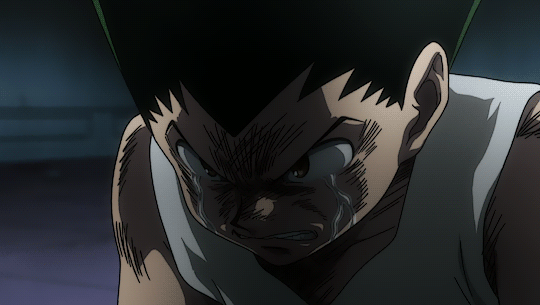
Hunter x Hunter is a great example of this for shonen manga, as is Attack on Titan. Both ultimately affirm the main cores of friendship and love in shonen, but they do that through taking different angles to look at common tropes. For example, Gon's self-reliance is actually a trauma response that we're supposed to be horrified by as it destroys our plucky protagonist, and Eren becomes a villain protagonist but his core motives never change. He's always wanted to kill the enemy, every last one, from chapter one.
Tragic Heroes and House of the Dragon

House of the Dragon has some interesting ideas, albeit its taking a very flawed approach to them (dare I say, a reactionary approach in which they're leaning too hard in the other direction from what GoT did and whitewashing their female characters... which makes them seem less human, not more so).
Still, despite its flaws, HOTD is carrying the tragic arc that Dany-villain theorists argue she'll have. Rhaenyra and Alicent both go mad, even if not in terms of mental illness, and Rhaenyra is determined to rule whatever the cost. Innocents pay the price. However, I see issues with this argument.
Repeating this arc with Daenerys in the main saga then is cynical and nihilistic, because it renders the entire existence of Fire & Blood pointless.
So then, why did Martin write Fire & Blood? Besides procrastinating on The Winds of Winter, anyways? Regardless of his intent, Rhaenyra's story is Daenerys's if she becomes a tragic hero (arguably a villain, but with a well-written fall from grace that makes her more tragic), give or take a century. Why tell the same story twice, the past story instead of the future?
Yeah, parallels are a thing in literature. I've even talked about how Daenerys does parallel Rhaenyra, and that's intentional. So does Stannis, so does Arianne, so does Cersei. But parallels are not 1=1 copies, or that becomes repetitive writing.
Unless Martin is trying to reinforce that nothing changes and nothing ever will (thanks, D&D, for your discussion of brothels as a priority in the very last five minutes of season 8!), so it doesn't even matter to try, there's got to be a reason for the parallel that isn't just lazy writing. Don't get me wrong, lazy writing exists even for the best of writers, but then why would you write Fire & Blood as a full story and go on to produce a story about it unless you're a cynical nihilist who truly, truly, truly hates women and thinks they can never, ever rule?
Female Leaders Bad: Misogyny in Fire and Blood
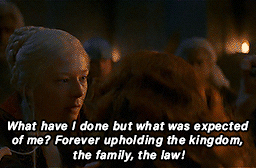
Yes, admittedly George RR Martin has issues with how he writes women. There's some subtle sexism in his works. No doubt.
That said, he also seems largely aware of other aspects of misogyny in society, and particularly of societal misogyny driving tragedy. If he hadn't written Cersei's chapters in A Feast for Crows, we might have a different story, but he did write those. Cersei's a villain, but she's so undeniably human and complex in her chapters that we can't help but see her as a person and appreciate her, even if we still want her stopped.
What makes Cersei sympathetic is precisely that misogyny. We see how her father's expectations of Jaime and even Tyrion differ from his of her. She was sold off to the highest bidder, in essence, and subjected to Robert's humiliating and public affairs, marital r*pe, and abuse. Is it any wonder she sought comfort where she could find it? Any other man would have been caught and Cersei executed for betraying the king who's doing the same thing and in public, but her twin brother has plausible deniability for being close to her.
As much as Cersei's actions are "ew" at best, we feel for her. During her walk of shame, we're outraged on her behalf even if we know she's going to plot a revenge that will destroy innocents, and indeed that her ending up having to take that walk is a result of her scheming against an innocent sixteen year old girl (Margaery Tyrell).
Fire & Blood only expounds on the concept of misogyny ruining lives and the realm. Rhaena. Aerea. Rhaenys. Laena. All passed over for the throne on account of their sex, and noted to be upset by it.
In fact, Alysanne, one of the few queens who does maintain equal power with her husband, has her attempts to educate women and protect her daughters from being married off too young (and then dying in childbirth) thwarted, and this thwarting is framed as wrong. Throughout Alysanne and Jaeherys' reign, the question of letting females rule as queens is a major point of contention between Alysanne and Jaeherys. The treatment of female rulers as "lesser" is honestly one of the longest-running motifs in this story, and it's never once held up as positive or justified.
Of course, the most clear "misogyny bad" characters are Rhaenyra and Alicent.

Alicent does everything the realm asks of a woman of good breeding, and she expects a reward for it: power and her legacy of her children sitting on the throne. Her legacy is literally only to arrange the power for the men in her life: her father, her husband, her sons.
And then you have Rhaenyra. She lives like a modern woman. She sleeps with whom she wants when she wants, and upon being forced into marriage with a gay man, lets him pursue men. She has a relationship in the books that is romantic/sexual with Laena as well as with Daemon. In other words, Rhaenyra has a consensual open marriage with poly elements. Laenor loves her sons as his; in fact, they are his, even if not in blood. Very modern indeed.
But society doesn't see it that way. Society, traditional, homophobic, and misogynistic, says Laenor's sons are bastards despite his loving and raising them. It says Rhaenyra pursuing her sexuality far less openly than certain past kings who sat on the Iron Throne makes her unfit. And the tragedy is that it does, but it shouldn't be this way. It's not her actions but her ignorance about how her actions will be perceived, her hubris in assuming she is exempt from society's strict rules for women.
One of the TV show's better decisions was to intercut Rhaenyra and Daemon's first almost-sex scene with Alicent and Viserys. Rhaenyra's pursuing what she wants. It's consensual. They're both into it, aware, and Daemon doesn't have power over her--in fact, that's the point. In Viserys and Alicent's scene, where they're married, Alicent so does not want to be there. Intercutting Daemon and Rhaenyra's passion with Alicent's misery reminds the audience that Rhaenyra doing this is not going to end well.
It's not fair. It's not right. It's tragic.
Tragic Heroes and Fantasy Deconstruction
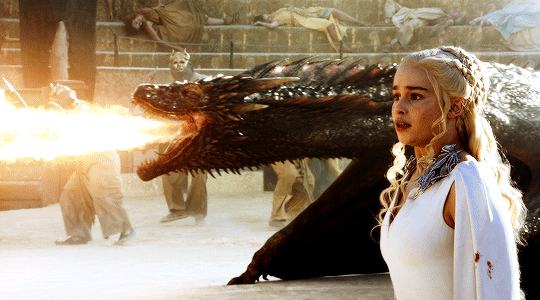
Okay, so now we're going to discuss fantasy tropes.
Let's start by addressing Martin's statements on fantasy and tropes. A lot of ASOIAF's tropes pull at least in part from exactly what most modern fantasies draw from: The Lord of the Rings, the same work Martin has said he wants to pull apart and explore what its ideals mean.
Ruling is hard. This was maybe my answer to Tolkien, whom, as much as I admire him, I do quibble with. Lord of the Rings had a very medieval philosophy: that if the king was a good man, the land would prosper. We look at real history and it’s not that simple. Tolkien can say that Aragorn became king and reigned for a hundred years, and he was wise and good. But Tolkien doesn’t ask the question: What was Aragorn’s tax policy? Did he maintain a standing army? What did he do in times of flood and famine? And what about all these orcs? By the end of the war, Sauron is gone but all of the orcs aren’t gone – they’re in the mountains. Did Aragorn pursue a policy of systematic genocide and kill them? Even the little baby orcs, in their little orc cradles?
I think this quote gets grotesquely taken out of context, honestly. I really don't think this is Martin saying that he literally wants to explore tax policies or only what happens after someone becomes king. Instead, he's speaking of how he wants the reader to look between the lines, look at how a good person can be a terrible leader precisely because of the goodness (Robb Stark) while a more morally dark person can be a great leader (Tyrion). Martin's saying that his works are messy and ask the questions, not that he literally wants to destroy everything Tolkien upholds because he thinks it's bullshit or because he thinks good people can't be good rulers without going insane.
In other words, he wants to deconstruct it and examine what makes someone a good or a bad ruler, what makes someone a good or a bad fantasy hero. Which he then literally said:
The battle between good and evil is a legitimate theme for a fantasy (or for any work of fiction, for that matter), but in real life that battle is fought chiefly in the individual human heart. Too many contemporary fantasies take the easy way out by externalizing the struggle, so the heroic protagonists need only smite the evil minions of the dark power to win the day. And you can tell the evil minions, because they're inevitably ugly and they all wear black.
I wanted to stand much of that on its head.
In real life, the hardest aspect of the battle between good and evil is determining which is which.
Okay, yay. Now that's done. Let's look at some actual tropes.
What is Aragorn's? He's the long lost heir coming to claim their throne after their heroic mission. This is the most classic fantasy arc.
It's the same archetype both Daenerys and Aegon are based on.
I talked about this at length here, but in short: Aegon is the stereotype of this trope. But it's deconstructed. How?
Because while Aegon truly believes he's a long-lost prince come to claim his birthright, he's wrong. Being wrong doesn't make him a bad person. It doesn't make him a villain. It just makes him wrong.
This is a far more interesting and thematically rich development than Daenerys finding out she's not the real trope and getting mad about it. She's the one with dragons and she wasn't alone for years (Viserys).
Aegon embodies another trope, too: that of the long-lost secret prince/princess/hero who grew up not knowing that they were special. Think Harry Potter. Also think about Jon Snow, who is Rhaegar's actual son.
But rather than Jon Snow's heritage mattering to him because of a claim to the throne, Jon's heritage will likely matter far more for his internal self-perception. Romanticism, baby. That's what it's all about.
And then you have Arianne.
Arianne is the princess who wants to rule/fight and is righteously angry at sexism. This is another common fantasy trope (see, Eowyn). Daenerys is also this. However, Arianne finds out she's a pawn. Not so for Dany, who has to struggle and face abuse and numerous betrayals. This isn't to say Arianne doesn't struggle and that her pain isn't valid because it is, but Arianne is the more typical embodiment of these tropes. Daenerys is them pulled apart and looked at from new angles. Dany wants to be a savior when she rules, to set people free, not just because of her birthright (though that's a part of it for sure!) but because she knows what it's like to be bought and sold. Arianne wants to rule because of her birthright. Arianne's motives are far less internally explored; she just doesn't want to bow. Which is valid! But not quite up to Romantic standards.
Lastly, Arianne and Jon both have daddy issues, and I'm not talking about Rhaegar for Jon. Ned's his dad even if not in blood. The "my father's not whom I thought he was!" trope is present in both of them: literally for Jon, and for Arianne, in terms of Doran actually planning for a Targaryen restoration.
But again, Arianne's trope points outwards more than it does inward. Her goal is still simply to rule as queen. Aegon's is to restore the Targaryen dynasty. These are pretty typical goals for characters in fantasies. They're external.
Jon's goal, however, is to save people from the Others, the undead. Daenerys's goal is to save people from slavery. See how there's a difference?
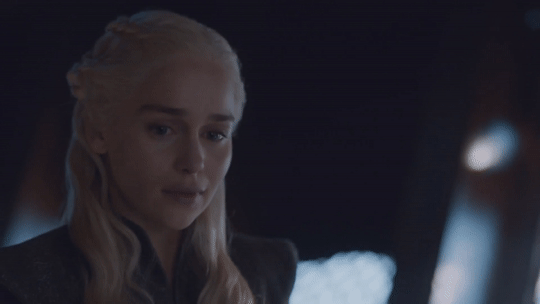
Plus, there's development towards both of Jon and Dany having to take long, hard looks inward in order to accomplish these goals. Now Jon's dead, temporarily. I'm pretty sure that's gonna give him a complex even though he won't be an Other when he's resurrected. Pretty likely she's going to end up killing a lot of people at King's Landing, even if she doesn't intend it to have as far-reaching of consequences as it does, to get her to consider who she is and who she wants to be.
The tragic irony of focusing on restoration and rule without considering what that means is that Arianne and Aegon are likely to go up in flames. Martin's not saying that these tropes are bad, but he is saying that they're shallow (the tropes not the characters) and don't fully capture the human heart against itself struggle. He's not wrong, either.
Hence, you already have characters whose desires to restore Targaryen rule and to be queen of the Seven Kingdoms gets them killed, even if they are good people who do not deserve what happens to them. Why repeat this with Daenerys? That doesn't offer us much of anything in terms of literary parallels.
But, if we want to talk about literary parallels, let's turn again to Fire & Blood, where there's another Princess Daenerys born to Jaeherys and Alysanne. She's described as a loving, kind child who adores her siblings, her parents, animals, and more. She dies of the Shivers, a disease that manifests through symptoms of cold that kill you. Gee, I wonder what that's foreshadowing. It's not like Dany's facing off with an army of the living embodiment of Cold and Ice... oh wait.
Dany's Tropes Deconstructed
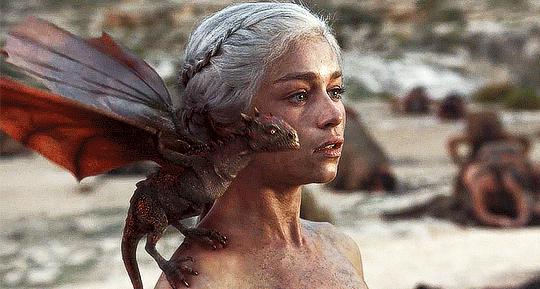
It's also true that as the Chosen One, Daenerys fulfills many villain tropes too. She's leading an outside force to invade a kingdom. She's also the daughter of a mad King who terrorized the land years before, come back to seek what is hers with fire and blood. The assumption seems to be that because she has these tropes, she must be a villain.
Listen, Martin does not play tropes straight. Ever.
Think about Sansa, and how her arc is dismantling her fairy tale simplistic ideas of what knights and chivalry and kings are like. However, Sansa maintains compassion at the core of her character in the books. She still loves. Martin's not saying that chivalry and believe in love are stupid little girl ideas. He's critiquing simplistic ideas, while showing that someone can maintain her compassion while being a shrewd politician. Through Sansa, we have cynical knights like Sandor learning how to become the courageous knights of old. That's idealistic more than anything else.
Why would Dany's supposed villain tropes be played straight? What if... the invading force is actually the saving force? I mean, I do think that Daenerys will do Bad Things in Westeros with her dragons and invading forces. But does that make her a villain?
"Everyone is the hero of their own story!" Well, sure. Yes. Very true. Martin even said this. That's not a novel idea, nor is it a terribly interesting deconstruction by itself. "Our hero is actually a villain" already exists in the series, because Martin has zero problem narrating through villains (see, Cersei).
What if that question is precisely what we're supposed to be asking: what makes a hero from a villain? What if the keyword from "everyone is their own hero" isn't the word that's never mentioned--villain--and instead "hero?" As in, the question is how someone can become a hero regardless of perception, rather than how readers' perceptions are actually warped?
In other words, the onus might be on the character's journey, not the reader's perception.
Bittersweet Romanticism
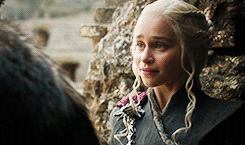
Dany's motives have always been wanting to free people. That's a far cry from Arianne's desire to be queen and an even farer cry from Eren Jaeger's "I want to kill all the enemies." In Daenerys's first chapter, she thinks about how she wants to be home and safe, and how she wants to please people.
Dany giving her all to save the world after burning the people she wanted to help, and doing it knowing that she won't be remembered well except by those who loved her and she'll be thought of as a villain--what could be more heroic in the scheme of the world? To know you will gain absolutely nothing from saving the world, and to do it anyways?
Of course, people in King's Landing who think her a villain for their losses aren't going to be entirely wrong, either. It depends on perspective, indeed.
Still, this gets to the heart of what it means to be a hero in principle, and what makes a hero heroic. It's beautiful, haunting, and cathartic. It doesn't taunt the reader with what they didn't realize, but instead satisfies with Dany achieving her goals: to create a safe-ish world to live in, a world with freedom and possibilities.
Even if she won't be a hero in the eyes of history, she will be in her core, in her heart of hearts. The individual focus, the heart against itself--readers will be privileged to know her story of heroism, even if her world doesn't.
That's Romantic to a T. That sounds like Martin to me. And, it sounds peak "bittersweet," the word Martin used to describe the broad strokes of his planned ending.
There's an additional beautiful aspect here, in that Dany would comment on her ancestor's legacy. Let's not forget that Valyria was a slave society founded upon mass human sacrifice. Daenerys as a liberator who destroys not just slavery, but who leaves room for progress away from feudalism and who saves the world from the Others whose primary value is seeking to destroy human life and turning everyone into a mass army of corpses (sounds like extreme slavery to me)... that means she destroys her family's legacy in all the right ways.
It should burn. But Dany won't be Mirra Maz Duur tied to a pyre for the Starks to ignite like in the show. She'll be doing what she did at the beginning: lighting the pyre. Her beloved won't be lying in the flames to be consumed, but instead supporting her. And this time what emerges from death will be not dragons, but human life.
#daenerys targaryen#jon snow#tyrion lannister#jonerys#rhaenyra targaryen#alicent hightower#daemon targaryen#arianne martell#f!aegon#young griff#aegon vi targaryen#eren jaeger#gon freecs#asoiaf#a song of ice and fire#asoiaf meta#got meta#anti-got#romanticism#asoiaf theory#valyria#cersei lannister#deconstruction
293 notes
·
View notes